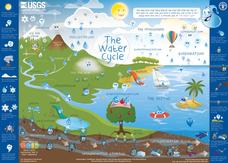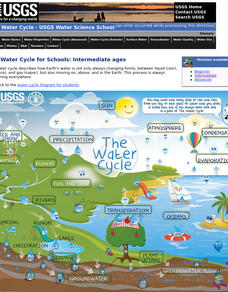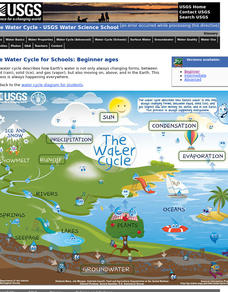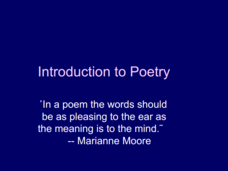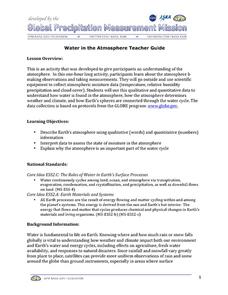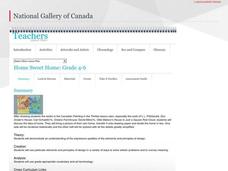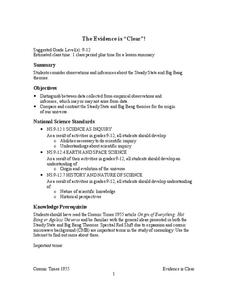US Geological Survey
Water Cycle Poster
How many parts make up the water cycle? How many things on Earth rely on water as a system? Learn more about the water cycle in an informative and colorful poster. Print and hang, or project the graphic in the classroom for optimal use.
US Geological Survey
The Water Cycle for Schools: Intermediate Ages
Water can travel from the highest mountain tops to the largest oceans. Using an interactive, young scientists trace the movement using an interactive online resource. They follow the water cycle by reading pop-up explanations on a...
US Geological Survey
The Water Cycle for Schools: Beginner Ages
Explore a day in the life of a water droplet. An interactive infographic helps scholars learn how water cycles work from precipitation all the way around to condensation. Learners hover over each step of the cycle to read more as they...
National Park Service
The Water Cycle Game
Take young scientists on a trip through the water cycle with this interactive science activity. After setting up a series of ten stations representing the different places water can be found, children use the included printable dice to...
TCI
Celebrating Our Constitution
School House Rock's "Preamble" launches a study of the Preamble of the US Constitution and the relevance of this 200 year-old document today.
NASA
How Does a Hurricane Form?
Young meteorologists examine the formation of a hurricane in a resource focused on severe weather conditions. Once they learn that a hurricane is also a tropical cyclone, and detail the different levels associated with tropical storms,...
University of North Carolina
Clichés
When it comes to writing, cliches are as old as dirt. A handout on tired phrases provides examples of cliches, as well as a description of the negative effects they have on a paper. Writers discover specific words and phrases to avoid,...
Glynn County School System
The Outer Planets
Are outer planets just like inner planets? Nope! The outer planets are much more spread apart than the inner planets. An informative PowerPoint presentation shows why this is true as well as facts about the individual planets in the...
Forest Foundation
Forest Watersheds
Where does the water we use come from? To understand the concept of a watershed, class members study the water cycle and then engage in an activity that simulates a watershed.
US National Archives
The Royal Seal What Can It Tell Us?
Analyze the images and details of the Great Seal of Queen Elizabeth I, and discover clues that reveal how one of the greatest monarchs in the history of England wished to be seen and respected. This is a great way to discuss how even to...
Curated OER
Whale Song Acrostic
What do whales sing about? Invite your class to imagine the thoughts of whales before writing acrostic poems on the topic. The plan blends together a bit of life science with plenty of opportunities for creativity and writing.
K12 Reader
The Inner Planets
Here's a reading exercise that uses an article about the inner planets to assess comprehension. After reading the article, kids respond to a series of questions using information from the text.
K12 Reader
Water Water Everywhere
The protection of our water supply is the subject of an article used in this cross-curricular reading comprehension worksheet. After studying the passage, readers use information from the text to respond to a series of comprehension...
K12 Reader
Meteorologists
Meteorologists and the tools they use are the subject of a reading comprehension learning exercise that asks kids to read the attached article and respond to a series of comprehension questions.
Curated OER
Introduction to Poetry
What makes a poem a poem? Give your class a basic understanding of some of the different aspects of poetry by showing them a slide show of poetic devices and elements. The presentation is quite long, so you might split it up into a few...
National Geographic
Altitude: What's in the Air?
Introuduce your scientists to the differences in air at varying altitudes with a colorful explanatory graph. After some discussion, they view unbelievable footage of mountain-climbing Leo Houlding and a narrative about how he might do...
Curated OER
Water in the Atmosphere
A slide show serves as the backdrop for a lesson on the moisture in Earth's atmosphere. Through it, mini meteorologists learn about the attributes of the atmosphere and actually use data-collecting weather tools to make observations and...
National Gallery of Canada
Home Sweet Home
What are your pupils' homes like? Incorporate their homes into a drawing lesson. Using an enlarged photograph, class members draw a grid so they can easily split their drawing in half. The final product should demonstrate cool colors,...
Signing Time Foundation
What is the Water Cycle?
Dive into an exploration of the water cycle cycle with this simple earth science activity. After first discussing where rain comes from, young scientists define the terms condensation, evaporation, transpiration, and precipitation as a...
NOAA
The Cycle of Water
Help young scientists get to the bottom of the water cycle with this comprehensive earth science lesson. After first viewing and discussing presentations about the states of water and the water cycle, the class performs a series of...
Soft Schools
Metaphor and Similes in Literature: A Challenge
After identifying the similes and metaphors in a series of lines from poems, individuals then explain what is being compared and the characteristics the two items share.
Curated OER
Close Reading of “The Necklace”
Designed for teachers, this 12-page packet uses passages from Guy de Maupassant's "The Necklace" to model how to design activities that encourage close reading of complex text.
West Contra Costa Unified School District
Introduction to Conditional Probability
Here is a turnkey lesson that walks young statisticians through the development and uses of conditional probability. From dice games to surveys, Venn diagrams to frequency tables, the class learns how a given can effect the overall...
NASA
The Evidence is “Clear”!
Do you think you know better? Become a scientist and prove it. Scholars review the evidence for two different theories of the origins of the universe. They notice the empirical observations as well as the inferences to determine which is...
Other popular searches
- Different Types of Clouds
- Types of Clouds
- Clouds and Precipitation
- Cirrus Clouds
- Making Clouds
- Weather Unit Plan Clouds
- Picture of Clouds
- Cumulus Clouds
- Stratus Clouds
- Clouds Experiment
- Weather Clouds
- Weather and Clouds


